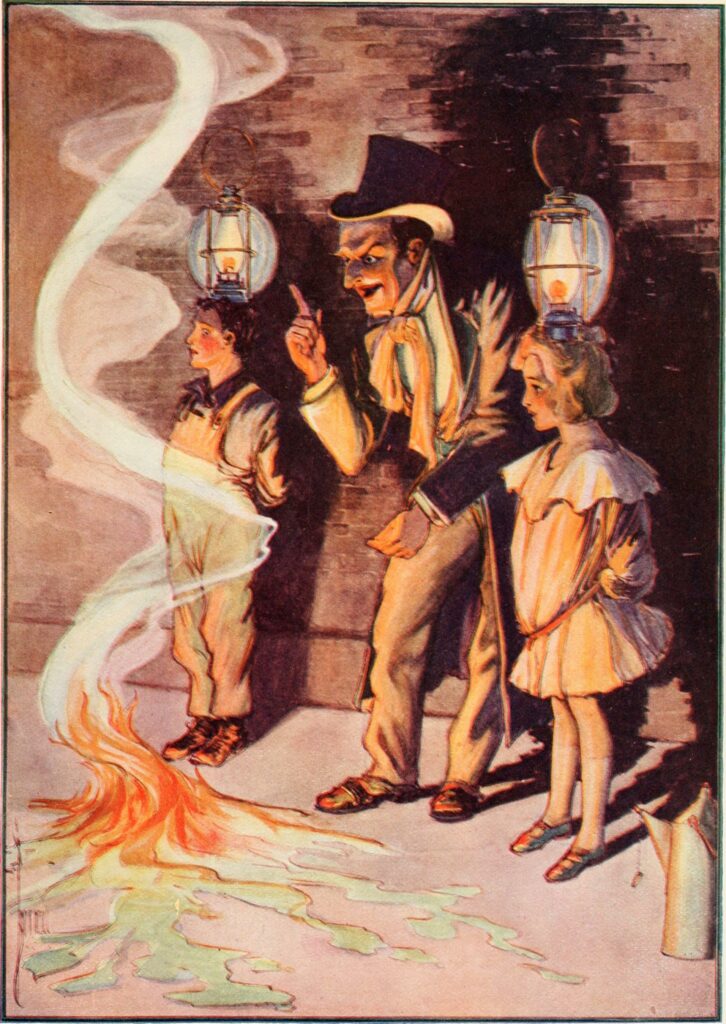Earlier, being unmasked for what he is serves as an ironic defeat for a weak fraud Wizard. Even so, he is not evil and treats Dorothy kindly, when forced into it. Belying the Wizard’s earlier timidity, Dorothy and the Wizard of Oz shows off the wily, pitiless, and courageous side that must have allowed him to survive in Oz. At the same time, though, he remains a comical and absurd figure who readily admits, to Dorothy at least, that he is a complete humbug. Up against the Mangaboo Sorcerer, the Wizard shows he has the wild confidence necessary for a con(fidence)man:
“We Mangaboos have, at the present time, one of the most wonderful Sorcerers that ever was picked from a bush; but he sometimes makes mistakes. Do you ever make mistakes?”
“Never!” declared the Wizard, boldly.
“Oh, Oz!” said Dorothy; “you made a lot of mistakes when you were in the marvelous Land of Oz.”
“Nonsense!” said the little man, turning red—although just then a ray of violet sunlight was on his round face (46).
He pits himself against someone with genuine magical powers and succeeds in outperforming him using circus tricks. The Wizard also has no hesitation to kill, chopping the Sorcerer apart, in self-defense, yes, but without any wavering. The Wizard is a ruthless man. The most disturbing moment of the novel is likely when, after the vegetable Princess whom Dorothy has just saved from a conspiracy explains her plans to kill the meat people (the ingrate), the Wizard lays on some more trickery to persuade the Mangaboos to spare them.
Just then his [the Wizard’s] eye fell upon the lanterns and the can of kerosene oil which Zeb had brought from the car of his balloon, and he got a clever idea from those commonplace things.
“Your Highness,” said he [the Wizard], “I will now proceed to prove my magic by creating two suns that you have never seen before; also I will exhibit a Destroyer much more dreadful than your Clinging Vines.” [The Clinging Vines are one of the various methods they use to kill people.]
So he placed Dorothy upon one side of him and the boy upon the other and set a lantern upon each of their heads.
“Don’t laugh,” he whispered to them, “or you will spoil the effect of my magic.”
Then, with much dignity and a look of vast importance upon his wrinkled face, the Wizard got out his match-box and lighted the two lanterns. The glare they made was very small when compared with the radiance of the six great colored suns; but still they gleamed steadily and clearly. The Mangaboos were much impressed because they had never before seen any light that did not come directly from their suns.
Next the Wizard poured a pool of oil from the can upon the glass floor, where it covered quite a broad surface. When he lighted the oil a hundred tongues of flame shot up, and the effect was really imposing.
“Now, Princess,” exclaimed the Wizard, “those of your advisors who wished to throw us into the Garden of Clinging Vines must step within this circle of light. If they advised you well, and were in the right, they will not be injured in any way. But if any advised you wrongly, the light will wither him.”
The advisors of the Princess did not like this test; but she commanded them to step into the flame and one by one they did so, and were scorched so badly that the air was soon filled with an odor like that of baked potatoes. Some of the Mangaboos fell down and had to be dragged from the fire, and all were so withered that it would be necessary to plant them at once. [It is earlier established that this a Mangaboo is planted upon death to grow the next generation of the family line.]
“Sir,” said the Princess to the Wizard, “you are greater than any Sorcerer we have ever known” (80–83).

Burning several people to death in front of two children is completely unnecessary, but the Wizard does it anyway. His quick wit and sociopathy make it clear how the Wizard managed to conquer Oz—though less so how he could have held his own against the Wicked Witches—and also why Neill would draw him in such a frightening way. The Wizard has two pistols and a sword and dishes out what violence he needs to. He is clever, always willing to fight, and never gives up. Even facing the vicious Wooden Gargoyles, he sides with the brave Dorothy rather than fearful Zeb:
“Suppose we escape down the stairs, too,” suggested the boy [Zeb]. “We have time, just now, and I’d rather face the invis’ble bears than those wooden imps.”
“No,” returned, Dorothy, stoutly, “it won’t do to go back, for then we would never get home. Let’s fight it out.”
“That is what I advise,” said the Wizard. “They haven’t defeated us yet, and Jim is worth a whole army” (139–140).
(Also, again, the tension is so much higher this time around!)